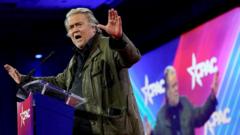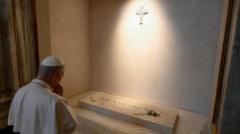**Pope Francis' election as the first South American pope marked a significant cultural and geographical shift for the Catholic Church, emphasizing the importance of the global south in its leadership.**
**Reflecting on Pope Francis’ Historic Election: A Shift in Leadership and Mission**

**Reflecting on Pope Francis’ Historic Election: A Shift in Leadership and Mission**
**Looking back on the 2013 papal selection that changed the trajectory of the Catholic Church.**
In March 2013, Jorge Mario Bergoglio, a cardinal from Argentina, was elected as the 266th pontiff of the Roman Catholic Church, making history as the first South American and the first non-European pope in over 1,200 years. Adopting the papal name Francis, he also became the first member of the Jesuit order to assume this significant role. The choice of Bergoglio, who was 76 years old at the time of his election, underscored a pivotal moment in church history, revealing the cardinals' intention to highlight that the future of the Catholic Church resided in the global south, where the majority of the world's Catholics live.
His roots, stemming from Italian immigrant parents in Buenos Aires, coupled with his reputation for humility and advocacy for the impoverished, positioned him uniquely to address the multifaceted challenges faced by the church. The Catholic Church was contending with a crisis of priest shortages, the rise of evangelical movements in Southern Hemisphere regions, a sexual abuse scandal that had significantly tarnished its reputation in Western societies, and internal governance issues within the Vatican.
The conclave that chosen Pope Francis was marked by fervent discussions among the cardinals regarding the urgent issues plaguing the church and the qualities they sought in a new leader. Cardinal Christoph Schönborn of Vienna aptly articulated that the election of a pope diverges fundamentally from a corporate political election. Instead of functioning as "the chief executive of a multinational company," he emphasized the role of the pope as "the spiritual head of a community of believers," reflecting the broader mission of the Catholic Church.
As Pope Francis settles into his papacy, the world watches attentively, pondering how his selection will ultimately shape the direction of the Catholic Church in the coming years.
His roots, stemming from Italian immigrant parents in Buenos Aires, coupled with his reputation for humility and advocacy for the impoverished, positioned him uniquely to address the multifaceted challenges faced by the church. The Catholic Church was contending with a crisis of priest shortages, the rise of evangelical movements in Southern Hemisphere regions, a sexual abuse scandal that had significantly tarnished its reputation in Western societies, and internal governance issues within the Vatican.
The conclave that chosen Pope Francis was marked by fervent discussions among the cardinals regarding the urgent issues plaguing the church and the qualities they sought in a new leader. Cardinal Christoph Schönborn of Vienna aptly articulated that the election of a pope diverges fundamentally from a corporate political election. Instead of functioning as "the chief executive of a multinational company," he emphasized the role of the pope as "the spiritual head of a community of believers," reflecting the broader mission of the Catholic Church.
As Pope Francis settles into his papacy, the world watches attentively, pondering how his selection will ultimately shape the direction of the Catholic Church in the coming years.




















